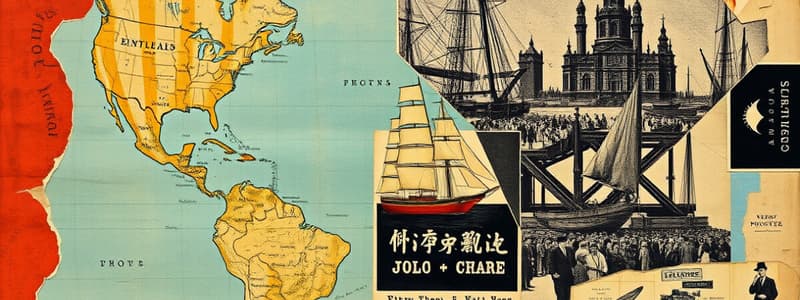Podcast
Questions and Answers
Which event was a direct response to increasing tensions between New England colonists and Native Americans?
Which event was a direct response to increasing tensions between New England colonists and Native Americans?
- The Glorious Revolution
- The Pueblo Revolt
- Bacon's Rebellion
- New England Confederation (correct)
What was the primary cause of King Philip's War?
What was the primary cause of King Philip's War?
- Westward encroachment of colonists on Native lands (correct)
- Alliance between European nations and Native Americans
- Desire to convert Native Americans to Christianity
- Trade disputes over furs
What was the immediate effect of Bacon's Rebellion in Virginia?
What was the immediate effect of Bacon's Rebellion in Virginia?
- Stronger governance by Sir William Berkeley
- Destruction of Jamestown and rebellion suppression (correct)
- Peaceful negotiation with Native American tribes
- Growth of local militia in Virginia
What was a key factor in the Pueblo Revolt of 1680 against the Spanish?
What was a key factor in the Pueblo Revolt of 1680 against the Spanish?
What characterized the economic relationships of colonists with Native Americans?
What characterized the economic relationships of colonists with Native Americans?
What was the main purpose of the Transatlantic Trade system?
What was the main purpose of the Transatlantic Trade system?
What key resource did the New England Colonies primarily export?
What key resource did the New England Colonies primarily export?
What theory held that a country's wealth was determined by its exports exceeding its imports?
What theory held that a country's wealth was determined by its exports exceeding its imports?
Which British legislation aimed to regulate colonial trade to benefit England?
Which British legislation aimed to regulate colonial trade to benefit England?
What was a significant challenge in enforcing the Navigation Acts?
What was a significant challenge in enforcing the Navigation Acts?
What was the consequence of England's unofficial policy of salutary neglect?
What was the consequence of England's unofficial policy of salutary neglect?
Which colonies were responsible for exporting rice and indigo?
Which colonies were responsible for exporting rice and indigo?
What did the sailors in New England trade for enslaved Africans?
What did the sailors in New England trade for enslaved Africans?
Which colonial region was primarily responsible for exporting wheat?
Which colonial region was primarily responsible for exporting wheat?
Which of the following was NOT a characteristic of the Navigation Acts?
Which of the following was NOT a characteristic of the Navigation Acts?
What was the intended economic purpose of the colonies under mercantilism?
What was the intended economic purpose of the colonies under mercantilism?
What was the consequence of England's policy of salutary neglect regarding colonial governance?
What was the consequence of England's policy of salutary neglect regarding colonial governance?
What was the outcome of King Philip's War for the New England colonies?
What was the outcome of King Philip's War for the New England colonies?
What prevalent economic practice did England utilize to control colonial resources?
What prevalent economic practice did England utilize to control colonial resources?
How did Bacon’s Rebellion reflect the tensions present in Virginia during the 17th century?
How did Bacon’s Rebellion reflect the tensions present in Virginia during the 17th century?
What was the primary motive behind the creation of the Dominion of New England?
What was the primary motive behind the creation of the Dominion of New England?
What significant change occurred in the governance of New England after the Glorious Revolution of 1688?
What significant change occurred in the governance of New England after the Glorious Revolution of 1688?
Flashcards are hidden until you start studying
Study Notes
An Atlantic Economy
- An Atlantic economy emerged between 1607 and 1754, facilitating the exchange of goods, enslaved Africans, and American Indians among Europe, Africa, and the Americas.
- The Transatlantic Trade, or Triangular Trade, consisted of a three-part route connecting North America, Africa, and Europe, featuring goods like rum, enslaved people, sugarcane, and resulting in rum production in New England.
- European nations utilized mercantilism, viewing colonies as avenues for increasing national power by maximizing exports over imports, with colonies primarily enriching the "Mother Country."
England and Mercantilism
- The Navigation Acts (1650-1673) directed British colonies to supply raw materials to Britain, ensuring colony production benefited British industries.
- Key exports included lumber and rum from New England, wheat from the Middle Colonies, tobacco from Chesapeake, and rice and indigo from Southern Colonies, among later cotton.
- Despite attempts to enforce the Navigation Acts, England's internal turmoil led to a policy of salutary neglect, allowing some trade evasion and smuggling among colonists.
- Some industries, such as shipbuilding and tobacco farming, grew, but low prices for exports, like tobacco, caused economic struggles for farmers.
- Resistance was common; colonists often undermined Navigation Acts through bribery and smuggling. Major crackdowns included the revocation of Massachusetts Bay's charter and the establishment of the Dominion of New England under Sir Edmund Andros, leading to tensions.
- The Glorious Revolution of 1688 resulted in increased royal control but also a loosening grip of imperial governance.
Broad Interactions
- Colonists' interactions with Native Americans hinged on trade, alliances, and conflict, with trade involving furs and crops for manufactured products.
- European diseases, such as smallpox, devastated Native populations, facilitating colonial expansion.
- Some colonies attempted conversion and assimilation of Native Americans; however, many colonists regarded them as inferior and sought territorial claims.
New England: King Philip’s War
- In the 1640s, threats from Native Americans led to the formation of the New England Confederation for military cooperation among Plymouth, Massachusetts Bay, Connecticut, and New Haven.
- King Philip’s War (1675-1676) stemmed from land encroachments by colonists, resulting in Metacom (King Philip) uniting tribes against colonial forces.
- The war ended in colonial victory, marked by the execution of Metacom, and highlighted the violent resistance to colonial expansion.
Virginia: Bacon’s Rebellion
- Bacon's Rebellion in 1676 arose from farmers' frustrations over attacks by Native Americans and the royal governor's inaction.
- Led by Nathaniel Bacon, western farmers attacked Native villages and burned Jamestown before the rebellion was suppressed and leaders executed.
- The rebellion underscored tensions between classes and resistance to royal authority, as well as conflict with Native Americans.
New Spain: Pueblo Revolt
- By 1680, the Spanish colony at Santa Fe faced unrest due to aggressive assimilation and the encomienda system.
- The Pueblo Revolt aimed to expel Spanish rule and succeeded temporarily until regained by Spain in 1692, leading to land ownership concessions for Pueblos.
- The revolt demonstrated resistance against colonization, yet resulted in some degree of stability following Spanish accommodations.
Key Takeaways
- Mercantilism drove England’s extraction of raw materials and sparked the transatlantic trade network.
- Interactions between European nations and American Indians involved both conflict and accommodation, primarily driven by competition for resources.
Key Vocabulary
- Atlantic Economy
- Transatlantic Trade
- Mercantilism
- Middle Passage
- Mother Country
- Navigation Acts
- Salutary Neglect
- Dominion of New England
- King Philip (Metacom)
- Pueblo Revolt
An Atlantic Economy
- An Atlantic economy emerged between 1607 and 1754, facilitating the exchange of goods, enslaved Africans, and American Indians among Europe, Africa, and the Americas.
- The Transatlantic Trade, or Triangular Trade, consisted of a three-part route connecting North America, Africa, and Europe, featuring goods like rum, enslaved people, sugarcane, and resulting in rum production in New England.
- European nations utilized mercantilism, viewing colonies as avenues for increasing national power by maximizing exports over imports, with colonies primarily enriching the "Mother Country."
England and Mercantilism
- The Navigation Acts (1650-1673) directed British colonies to supply raw materials to Britain, ensuring colony production benefited British industries.
- Key exports included lumber and rum from New England, wheat from the Middle Colonies, tobacco from Chesapeake, and rice and indigo from Southern Colonies, among later cotton.
- Despite attempts to enforce the Navigation Acts, England's internal turmoil led to a policy of salutary neglect, allowing some trade evasion and smuggling among colonists.
- Some industries, such as shipbuilding and tobacco farming, grew, but low prices for exports, like tobacco, caused economic struggles for farmers.
- Resistance was common; colonists often undermined Navigation Acts through bribery and smuggling. Major crackdowns included the revocation of Massachusetts Bay's charter and the establishment of the Dominion of New England under Sir Edmund Andros, leading to tensions.
- The Glorious Revolution of 1688 resulted in increased royal control but also a loosening grip of imperial governance.
Broad Interactions
- Colonists' interactions with Native Americans hinged on trade, alliances, and conflict, with trade involving furs and crops for manufactured products.
- European diseases, such as smallpox, devastated Native populations, facilitating colonial expansion.
- Some colonies attempted conversion and assimilation of Native Americans; however, many colonists regarded them as inferior and sought territorial claims.
New England: King Philip’s War
- In the 1640s, threats from Native Americans led to the formation of the New England Confederation for military cooperation among Plymouth, Massachusetts Bay, Connecticut, and New Haven.
- King Philip’s War (1675-1676) stemmed from land encroachments by colonists, resulting in Metacom (King Philip) uniting tribes against colonial forces.
- The war ended in colonial victory, marked by the execution of Metacom, and highlighted the violent resistance to colonial expansion.
Virginia: Bacon’s Rebellion
- Bacon's Rebellion in 1676 arose from farmers' frustrations over attacks by Native Americans and the royal governor's inaction.
- Led by Nathaniel Bacon, western farmers attacked Native villages and burned Jamestown before the rebellion was suppressed and leaders executed.
- The rebellion underscored tensions between classes and resistance to royal authority, as well as conflict with Native Americans.
New Spain: Pueblo Revolt
- By 1680, the Spanish colony at Santa Fe faced unrest due to aggressive assimilation and the encomienda system.
- The Pueblo Revolt aimed to expel Spanish rule and succeeded temporarily until regained by Spain in 1692, leading to land ownership concessions for Pueblos.
- The revolt demonstrated resistance against colonization, yet resulted in some degree of stability following Spanish accommodations.
Key Takeaways
- Mercantilism drove England’s extraction of raw materials and sparked the transatlantic trade network.
- Interactions between European nations and American Indians involved both conflict and accommodation, primarily driven by competition for resources.
Key Vocabulary
- Atlantic Economy
- Transatlantic Trade
- Mercantilism
- Middle Passage
- Mother Country
- Navigation Acts
- Salutary Neglect
- Dominion of New England
- King Philip (Metacom)
- Pueblo Revolt
Studying That Suits You
Use AI to generate personalized quizzes and flashcards to suit your learning preferences.




